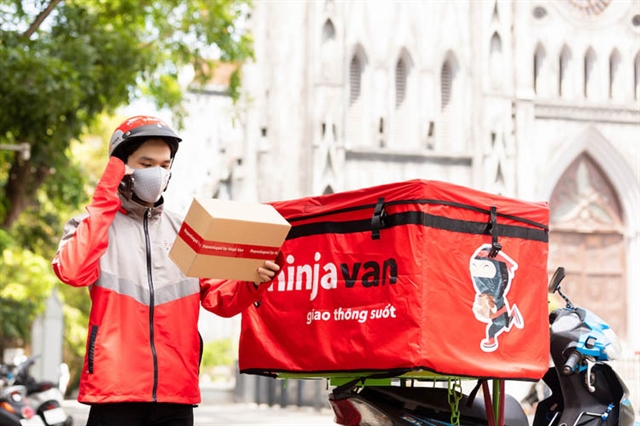 Economy
Economy


|
| Ninja Van has announced to cease operation in Việt Nam’s express delivery market from the end of September. — Photo baotintuc.vn |
HÀ NỘI — After nearly a decade racing to the doorstep of Việt Nam’s booming e-commerce market, Singapore-based logistics tech firm Ninja Van is making its final delivery run.
The company will exit the country’s express delivery sector by the end of September as part of a regional shake-up.
Nin Sing Logistics Co Ltd, which operates Ninja Van in Việt Nam, informed customers on Wednesday that all business-to-business(B2B) and business-to-consumer(B2C) express delivery services will stop on September 30 as part of a wider group restructuring.
The company will complete deliveries of existing parcels by September 26. Undelivered items will be returned by September 30.
Founded in Singapore in 2014, Ninja Van entered Việt Nam in 2016 and quickly became a major last-mile partner for e-commerce platforms such as Lazada, Shopee and Tiki, handling millions of parcels each month through a nationwide network of more than 4,000 points.
The withdrawal follows a series of operational and financial difficulties. In September 2024, the company closed its Vietnamese software subsidiary ECRM Nobita after delays in wage and social insurance payments to employees.
The shutdown of its express delivery operations in Việt Nam will allow it to reallocate resources and focus on developing a new logistics services model, Ninja Van said.
Robust growth, fierce competition
Ninja Van’s exit highlights the fierce competition in Việt Nam’s logistics sector as e-commerce platforms like Shopee and Tiktok build their own delivery arms or secure exclusive partnerships. Meanwhile, Lazada, once Ninja Van’s largest client in Việt Nam, has seen its market share narrow.
Before Ninja Van, delivery, ride-hailing and food ordering also witnessed the exits of big names such as Baemin, Uber and Gojek amid intensified competition.
The advantage is gradually shifting to domestic firms or those strongly linked with Việt Nam’s e-commerce ecosystem such as Viettel Post, SPX Express, GHTK and VNPost.
In the first six months of this year, Việt Nam’s postal and delivery market recorded double-digit growth, driven by booming e-commerce and the transition towards a digital economy but rising competition is reshaping the market.
According to the Ministry of Science and Technology’s statistics, the industry’s revenue increased by 12.8 per cent year-on-year to reach VNĐ38.3 trillion (US$1.5 billion) in the January–June period. The parcel volume handled jumped 16 per cent to 1.8 billion.
The e-commerce boom provided major growth momentum with Việt Nam’s e-commerce market projected to reach $33 billion this year, providing significant room for logistics and express delivery services.
The postal and delivery market is forecast to reach $10 billion by 2030 with an annual growth rate of 20–30 per cent.
The market, however, is witnessing fierce competition with service providers rolling out low-cost franchise models, increasing technology application to optimise operations as well as pushing price wars which are undermining the sector’s margins.
Notably, the rise of in-house logistics arms of e-commerce platforms is reshaping the delivery market.
Shopee Express (SPX Express) has rapidly built warehouses, sorting centres and delivery networks across major cities.
TikiNow Smart Logistics of Tiki is also a major player. Two-hour delivery in major cities is a key advantage of TikiNow which is also expanding services to external partners with an aim to become an independent logistics player.
Tiktok Shop has also begun piloting its own logistics services.
This trend allows e-commerce platforms to avoid dependence on third-party delivery service operators while gaining an edge on cost and delivery speed.
Statistics from Vietdata showed that Viettel Post leads with a market share of 17.2 per cent, followed by SPX Express at 15.7 per cent, GHTK 14.5 per cent and VNPost 13.8 per cent.
J&T Express holds 10.6 per cent, GHN 7.9 per cent and EMS 3.1 per cent. Small players include Ninja Van, Best Express, 247 Express, Nhất Tín and Ahamove which altogether account for around 20 per cent. — VNS




